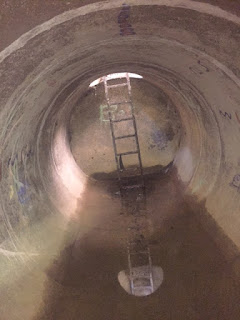A MEMBER of East Yorkshire's guerrilla army during the Second World War is urging others to reveal their secrets before it is too late.
Soldiers in East Yorkshire's Auxiliary Units were given orders to kill German soldiers and even assassinate senior community figures to protect Britain's infrastructure if the country was ever invaded.
However, they were made to sign the Official Secret Acts, forbidding them to talk, even to their closest relatives.
Now, researchers have discovered a network of underground bunkers used by the units including secret hideaways close to the villages of Rise, Middleton On The Wolds and Cottingham.The guerrilla fighters are being urged not to take their secrets to their graves.
Hornsea farmer Claude Varley, now 88, was a member of the Bewholme Area Unit and was trained to kill with his bare hands.
"We're all in our 80s and 90s now – if we die without saying anything, the secret dies with us. People should be taught about this and made aware of what happened. When I signed the Official Secrets Act, there was sweat coming off my forehead – they were holding a gun to me, making me swear I wouldn't say anything.I think that is why some people have never spoken – event though the Act only lasted 50 years. But it is important they do speak, so people know what we were required to do"
The Auxiliary Units hid out in underground bunkers and were prepared to sneak out and silently kill Germans.
If they were caught, they were prepared to kill themselves and had a list of people to shoot dead when an invasion was announced.School teachers, police officers, game keepers and the home guard commanders were on their hit list to prevent the senior community figures revealing any vital information to help the Germans.
Mr Varley said: "Should the Germans have invaded, we had a list of ten people we had to kill straight away so they wouldn't go blabbing. I will have known most of these people as neighbours and friends which will have made things personal but if it had come down to it, I would have done it.It would have been important to my country."
The wide beaches and low cliffs of the East Coast posed a serious risk of Axis invasion throughout the Second World War and bunkers were built all over the East Yorkshire countryside to conceal members of the Auxiliary Unit.
The plan was that once the Germans invaded, the soldiers, who had fled to their secret hiding places in fields and woods, would crawl out of the bunkers to massacre the enemy, one by one, if necessary. This type of guerilla warfare was not unknown in modern warfare but would, in 1940's England be unthinkable amongst the civilian and rather parochial local populations.
Three confirmed units based in Walkington some 20 miles inland on the Wolds, Bewholme about 3 miles from the coast and Aldbrough just to the south of Hornsea have been traced.
But it is thought there were 34 units and bunkers in East Yorkshire in total.
Claude Varley was one of 3,500 men trained at Coleshill House, near Highworth, Wiltshire, in guerrilla warfare including assassination, unarmed combat, demolition and sabotage.
Mr Varley, who still lives in Hornsea, said: "I was from a farming family, so I was a good worker, used to the outdoors and I knew the lay of the land.I wasn't someone who fussed and I knew that if I had to kill a man, I could have done it and gone home fine.People said what we did was dangerous work, but I always just had the attitude of 'get stuck in and stop moaning'."
He remembers his training at Coleshill and the instructions they received from senior command.
"I was given a rifle and a revolver and a tommy gun, but I hated the tommy – it was rubbish.We were also trained in unarmed combat so that meant we were trained to kill, there were no two ways about it. High powered rifles could kill at a six-mile range. We were given all the best weapons and guns. I knew in my head how I would attack – I planned to go round the side and get them in the back."
An estimated 214 men from East Yorkshire worked in the Auxiliary Units, with ages ranging from 16 to 54. Claude Varley was 18 when he was recruited into his unit.
He said: "I wasn't scared or frightened. I am not a panicky person. I think even at that age, I didn't have a fear.
"The most important thing to me was to protect my country. I wouldn't have been captured, they wouldn't have got me. But if they did, I was prepared to shoot myself. They didn't expect we'd last long anyway – we were only given two weeks' worth of rations.
Despite the soldiers remaining at home instead of fighting overseas, and the bunkers being relatively close to villages, little was known of the work of the Auxiliary Units.
"I couldn't tell my parents, even though I was in the Bewholme Unit with two of my brothers.I think my father knew something, but he never said anything. You didn't, because you knew talking was dangerous in the war.If we had been invaded, we were told to leave our homes without saying goodbye and go to the bunker.It would have been hard for my mother to have three sons disappear overnight, but we just had to do it."
As the old soldiers pass away many of the concealed hiding places will simply be lost to memory.
(Source Article from Hull Daily Mail- 2012)


No comments:
Post a Comment